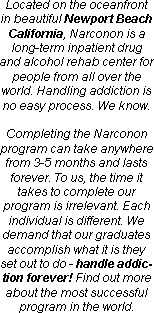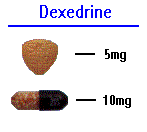
|
Navigate |
| Home |
| Kirstie Alley |
| Our 30th Anniversary |
| Never Turning Back |
| Narconon Endorsements |
| |
|
|
| |
|
|
| |
|
Facts About Drugs |
| FAQ About Ambien |
| FAQ About Ativan |
| FAQ About Cocaine |
| FAQ About Codeine |
| FAQ About Crack |
| FAQ About Darvocet |
| FAQ About Dexedrine |
| FAQ About Demerol |
| FAQ About Dilaudid |
| FAQ About Ecstasy |
| FAQ About GHB |
| FAQ About Heroin |
| FAQ About Hydrocodone |
| FAQ About Ketamine |
| FAQ About Lortab |
| FAQ About LSD |
| FAQ About Marijuana |
| FAQ About Morphine |
| FAQ About Meth |
| FAQ About Methadone |
| FAQ About Opiates |
| FAQ About Opium |
| FAQ About Oxycontin |
| FAQ About Percocet |
| FAQ About Percodan |
| FAQ About Ritalin |
| FAQ About Rohypnol |
| FAQ About Ultram |
| FAQ About Valium |
| FAQ About Vicodin |
| FAQ About Xanax |
  |
|
Resources |

|


 Print this article |  Send this article to a friend |  Add to Favorites |
FAQ
About Dexedrine
|
A) Dextroamphetamine (Dexedrine) is an amphetamine, belonging to the group of medicines called central nervous system (CNS) stimulants it is a Schedule II controlled substance. Dexedrine was often used in the late 60s and early 70s as a prescription diet aid, because one of the effects of such stimulant drugs is to suppress appetite. Dexedrine (and its more potent cousin Benzedrine) was also commonly (and illegally) used by college students, either for the stimulant high it provided or as a study aid. |
Q) How does Dexedrine work?
A) This drug works by suppressing all spontaneous behavior. Dexedrine reduces all spontaneous or self generated activates which is shown by the following characteristics: exploration and curiosity, socializing, and an increase in obsessive-compulsive behaviors.
Q) What does Dexedrine look like?
A) Dexedrine is manufactured in orange 5mg, 10mg, 20mg tablets and 5mg, 10mg, and 15mg clear and brown capsules.
Q)
What side effects occur with the use and abuse of Dexedrine?
A) The side effects that occur with Dexedrine are: addiction, agitation/irritability, insomnia, dry mouth, headache, nausea, weight loss, hallucinations, liver irritation/toxicity, increased heart rate, tics, Tourette's syndrome, sexual difficulties, behavior disturbances, and thought disorder, elevation of blood pressure, over stimulation, restlessness, dizziness, euphoria, headache, exacerbation of motor skills, diarrhea, and constipation.
Q) What are the symptoms of a Dexedrine overdose?
A) The symptoms of a Dexedrine overdose are: abdominal cramps, assaultiveness, coma, confusion, convulsions, depression, diarrhea, fatigue, hallucinations, high fever, heightened reflexes, high or low blood pressure, irregular heartbeat, nausea, panic, rapid breathing, restlessness, tremor, and vomiting.
Q) What drug interactions occur with the use and abuse of Dexedrine?
A) The drug interactions which can occur with the use / abuse of Dexedrine are:
MAO Inhibitors (within 14 days) - serious, even fatal, interactions can occur
Acidifying agents like guanethidine, reserpine, and fruit juices can lower absorption of Dexedrine.
Alkalinizing agents such as Diamox (acetazolamide) increase absorption of Dexedrine and other amphetamines.
Tricyclic antidepressants may increase their levels when taken with Dexedrine. Although tricyclic antidepressants may be used with amphetamines to help make them work better, using the two medicines together may increase the chance of fast or irregular heartbeat, severe high blood pressure, or high fever.
Thorazine (chlorpromazine), lithium, and Haldol (haloperidol) can lower the effectiveness of Dexedrine.
Dexedrine
increases the effects of norepinephrine.
Amantadine (Symmetrel), Caffeine
(NoDoz), Chlophedianol (Ulone), Methylphenidate (Ritalin), Nabilone (Cesamet),
Pemoline (Cylert)- these medicines may increase the stimulant effects of Dexedrine
and cause nervousness, irritability, trouble sleeping, and possibly convulsions
(seizures).
Appetite suppressants (diet pills), Medicine for asthma
or other breathing problems, Medicine for colds, sinus problems, or hay fever
or other allergies (including nose drops or sprays) - these medicines may increase
the stimulant effects of amphetamines and cause nervousness, irritability, trouble
sleeping, or convulsions (seizures), and affect the heart and blood vessels.
Beta-adrenergic blocking agents (beta blockers) may increase the chance of
high blood pressure and heart problems when taken with Dexedrine
Digitalis
glycosides (heart medicine). Amphetamines may cause additive effects, resulting
in irregular heartbeat.
Meperidine - when Dexedrine is taken at with
meperidine, it increases the chances of certain side effects such as fever, convulsions,
and even coma.
Thyroid hormones-The effects either of these hormones
or of Dexedrine may increase when both are being taken.
If
you have a problem with dexedrine addiction call Narconon Southern California
drug rehab center, we can help 1800 US NO DRUGS

comment corner
 |
| drug rehabilitation saving taxpayers |
California taxpayers are saving more money than expected due to ... |
 |
| Study: Marijuana Causes Lung Damage |
New research finds that smoking three or four marijuana cigarettes ... |
 |
| Thanks to Online Pharmacies, Addiction Can Be Just a Click Away |
WASHINGTON -- Kelly Knable, a 34-year-old mother of three from ... |
 |
| Balancing pain and drug addiction |
Over the past two decades, two conflicting medical ideas have ... |
 |
| Clean break |
... |
 |
| State officials create prescription drug abuse task force |
TALLAHASSEE, Fla. -- State officials on Friday announced the creation ... |
 |
| Florida system often fails to catch Medicaid abuse at source |
FORT LAUDERDALE, Fla. - (KRT) - The victim's skin was ... |
 |
| Marijuana's rising threat: For more kids, use turns into addiction |
John Brown experimented with marijuana at age 10, and it ... |
 |
| Student gets state prison term for selling marijuana |
EASTON -- David Messina had his whole life ahead of ... |
 |
| Man charged in cocaine case forfeits $585,000 |
An Iowa truck driver arrested by Kentucky Vehicle Enforcement officers ... |
 |
| Cocaine Curtails Body's Ability to Cool Off |
In addition to triggering life-threatening cardiovascular episodes, cocaine can be ... |
 |
| Science for Cops |
I admit it: I'm a Law & Order fan. ... |
 |
| New Gene Therapy Could Help Quell Alcoholic Cravings |
One prevailing view of addiction holds that alcohol and other ... |
 |
| One Dose of Cocaine Primes the Brain for Addiction |
It isn't a myth: one dose of cocaine is all ... |
 |
| Marijuana Firmly Linked to Infertility |
Scientists from the University of Buffalo have smoked out what ... |
 |
| Moderate Alcohol Consumption Clouds Brain's Ability to Detect Mistakes |
It's common knowledge that a brain on booze doesn't function ... |
|
Narconon Pictures |
|
   |
|
 Q)
What is Dexedrine?
Q)
What is Dexedrine?